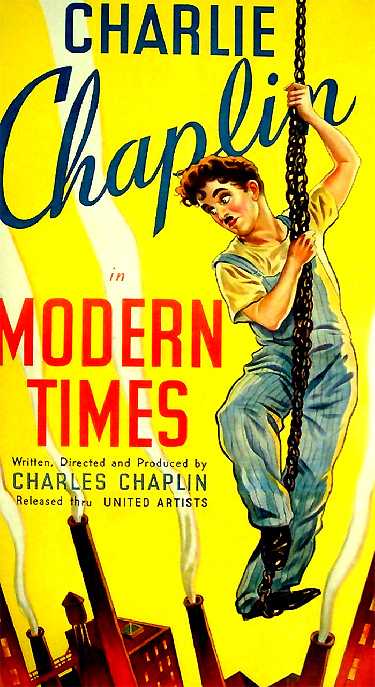Plot Synopsis (continued)
 Meanwhile,
one week later, the gamin dances joyfully on the street outside the
Red Moon Cafe known for having singing waiters. In her impromptu
audition, she is recognized by the owner: "She'd be good for
the cafe." She is offered a job dancing in the little cabaret
- in a quick dissolve, she is transformed from a rag-wearing gamin
to a fancy-costumed cafe dancer. Upon his release from jail one week
later, a transformed gamin awaits and hugs him cheerfully and he
immediately notices the changes in her appearance. She tells him
that she has obtained a job for him. In the cafe, she assures the
management that he would be a good employee. The owner asks: "Can
you wait on table?" and "Can you sing?" She answers
for the Tramp, promising that he can. The owner agrees to offer a
trial job: "All right. I'll give you a trial." Meanwhile,
one week later, the gamin dances joyfully on the street outside the
Red Moon Cafe known for having singing waiters. In her impromptu
audition, she is recognized by the owner: "She'd be good for
the cafe." She is offered a job dancing in the little cabaret
- in a quick dissolve, she is transformed from a rag-wearing gamin
to a fancy-costumed cafe dancer. Upon his release from jail one week
later, a transformed gamin awaits and hugs him cheerfully and he
immediately notices the changes in her appearance. She tells him
that she has obtained a job for him. In the cafe, she assures the
management that he would be a good employee. The owner asks: "Can
you wait on table?" and "Can you sing?" She answers
for the Tramp, promising that he can. The owner agrees to offer a
trial job: "All right. I'll give you a trial."
But juvenile authorities have other ideas. Because
she has escaped from juvenile officers, the County Juvenile Division
issues a WANTED for vagrancy notice for the gamin.
In the classic restaurant sequence, while waiting on
the customers that night, his leg is caught up a dog leash while
carrying a loaded tray. In the kitchen, he drills holes in a big
block of cheese to make swiss cheese. An irate customer complains
about the service: "I've been waiting an hour for roast duck." The
maitre d' reprimands the Tramp for his deficient waiting on tables.
Upset, the inexperienced Tramp enters the OUT door of the kitchen
instead of the IN door, knocking over a co-worker carrying a huge
tray. While delivering a large tray of roast duck held high in the
air, he is swept away by a crowd of dancers. The roast duck gets
stuck in the chandelier, is finally retrieved and brought to the
customer's table, but then becomes a rugby football in a game with
drunken guests.
The owner realizes he has failed as a waiter, but gives
him one last chance: "I hope you can sing." His appearance
is preceded by that of four singing waiters. The gamin assists him
in preparation - "Let's rehearse your song," she tells
him. After a few false practice trials, he realizes: "I forget
the words." So she suggests scribbling the words down on one
of his loose cuffs so he can remember them.
a pretty girl and a gay old man
flirted on the boulevard
he was a fat old thing
but his diamond ring
caught her eye as...
The practice goes perfectly, and he confidently strolls
out to the center of the cafe floor for his premiere as a singing
waiter. A dramatic introductory dance and gesture with his arms sends
both cuffs flying. So he must stall, and stall, and then improvise.
From the dressing room door, the gamin shouts:
"Sing!! Never mind the words." He makes up nonsense gibberish
full of foreign-sounding phrases in a double-talk song rendition to
the tune of Titana, the Cuff Song. (This was the first - and
last time - the Tramp's voice was ever heard in a film - and it clearly
makes the Tramp's point that words aren't as important as actions.)
...La spinach or la busho, Cigaretto toto bello,
Ce rakish spagoletto, Ce le tu la tu la trois! Senora fila scena,
voulez-vous la taximeter, Le jaunta sur la seata, Je le tu le tu
le waaah!...
His future as a singing waiter seems bright, and he
is brought out for an encore. The owner is pleased: "You're
great! I'll give you a steady job." But his triumph is brief.
Orphanage/juvenile officials show up in the club to take the gamin
away as an escaped vagrant. The Tramp grabs her and they run away,
tossing chairs into the path of their pursuers. The two of them successfully
escape.
The film ends with a classic set of sequences. At dawn
the next day, they are sitting at the side of a country road - away
from the city's overpowering technology. He is fanning his bare feet
before putting on his shoes. She has all her worldly possessions
in a tied-up ball. She cries and complains to him:
Gamin: What's the use of trying?
The Tramp: Buck up - never say die. We'll get along!
He encourages her to have fortitude and shows her how
to put a smile on her face. [Note: Via lip-reading, the Tramp's final
words are deciphered to be: "Smile! C'mon!"]
In the final, most memorable image, they are seen optimistically
walking arm in arm into the sunrise before a hilly horizon, and in
a sense are escaping from the hustle-bustle of the city and walking
back into the US' simple pastoral past. Rather than departing alone
(as in so many other, ever-optimistic walks by the Tramp in farewell
scenes), he is silhouetted with his love against the background,
walking down the dusty road toward the future for the last time. |